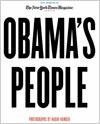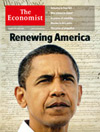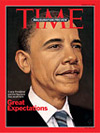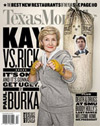O Town
The New York Times Magazine profiles the incoming administration.

New York Times Magazine, Jan. 18 In an issue devoted to the incoming Obama administration, Matt Bai, using words Norman Mailer penned to describe Kennedy just before his election, dubs Obama "the edge of the mystery." "After all, it is in no small part his basic elusiveness that makes Obama captivating to so many Americans—not so much the things we know about him as the things we still don't," Bai writes. During the transition, Obama has been seen as an outsider "who has arrived with pick and chisel to breach the ancient crypt of Washington." He could quickly lose his "outsider cachet," however, as Bill Clinton did after he backed away from his promise to allow gays into the military. … Nadav Kander's full-page photographs of incoming administration officials and advisers occupy 52 pages of the magazine—an attempt to capture the power of the moment. "Why not take account of this with portraits of those whose character and temperament and bearing may well prove consequential in the coming months and years?"

Economist, Jan. 17 An editorial details what the magazine wants from Obama's America: a "more modest giant, more obviously constrained by international law and more committed to working even-handedly for peace in the Middle East and elsewhere." Admiring Obama's understanding of "soft power," the editorial posits that America will now "listen more carefully to and work more closely with allies and rivals."… An article looks for an endgame for the Israelis in Gaza. The Israelis want a truce that would let their army stay on the outskirts of Gaza City until Hamas agrees to a "longer-lasting ceasefire" and promises to stop smuggling weapons form Egypt. … A dispatch from Houston finds that despite the high cost of "playing princess," debutante balls are still going strong, recession be damned.

Time, Jan. 26 The cover story declares that the $800 billion stimulus package must be spent with change in mind. It should promote Obama's top priorities, like "reducing our dependence on fossil fuels, investing in our future competitiveness and rebalancing our economic playing field." Spend money on things the country needs—green energy products, coastal restoration, infrastructure repairs, and job training—rather than "sprawl-inducing highways and bridges to nowhere, ethanol plants and pipelines that accelerate global warming [and] tax breaks for overleveraged McMansion builders."… A handy map provides a guide to Tuesday's inauguration festivities. … Men now make up 7 percent of the "Botoxed population," an article reveals. "Boytox," if you will, is part of the growing trend of "manscaping." The author, who could have expensed the injections for the story, ultimately decided not to be "that guy" who gets cosmetic surgery.

Texas Monthly, February 2009
The cover story by Paul Burka dubs the gubernatorial primary battle between incumbent Rick Perry and senior Sen. Kay Bailey Hutchison the "Thrilla in Manila" of Texas politics. Hutchison, a cheerleader turned TV reporter turned legislator, polls well with urban and suburban Texans, while the budget-balancing Perry has a lock on rural conservatives. Hutchison's 67 percent approval rating, compared with Perry's 51 percent, could make her a formidable opponent, if her voting record and sometime support of abortion rights aren't used against her. "The incumbent may be the last rural governor of Texas for quite a while, and a victory by the challenger could trigger an evolution of the Republican party."… A story chronicles a father's search for answers about his son's fatal drug overdose at a Southern Methodist University frat party in 2006. Tom Stiles found that key evidence had been left out of the university police department's file regarding the overdose, leading him to believe it was not an "isolated incident," as the university had insisted.

The Nation, Feb. 9 An article finds that Europeans, who have long admired black America, now want their own Obamas. "America had a black leader, and suddenly everybody else wanted one. Or at least they wondered how they could get hold of one." Even Germany has a Turkish leader of its Green Party who could someday become chancellor. However, "the question isn't whether nonwhite Europeans are ready to run for national office but whether white Europeans would embrace them."… An article stresses the important of investigating the Bush administration's abuses of power and use of torture. "We cannot simply shrug off the constitutional and criminal misbehavior of the administration, treat it as an aberration and hope it won't happen again."… The magazine announces the results of its "Name Our Epoch!" contest. "The Borrowed Times" won out against 4,000 other entries, including "the Bling Bang," "the Crassical Period," "the Age of Avarice," and "the Great Regression."
Must Read
Samantha Power's New Yorker profile of the International Justice Mission's Gary Haugen is a fascinating portrait of how one man has put his Christian faith into practice by pursuing justice abroad.
Must Skip
Newsweek's cover story essentially absolves the Bush administration of its sins, arguing that they were committed in the name of national security.
Best Culture Piece
A history of breast-feeding in The New Yorker leaves one wondering what babies benefit from: breast milk itself or the full sensory experience of breast-feeding.
Best Politics Piece
Legislators, incoming Obama administration officials, and fans of John Maynard Keynes ("the trendiest dead economist of this apocalyptic moment") should read Time's thoughtful cover story on how the economic stimulus money should be spent.
Least Depressing Article About Journalism
When every day seemingly brings an article about another folding newspaper, an article on the young Web innovators at the New York Times has lessons for newspaper editors around the country.